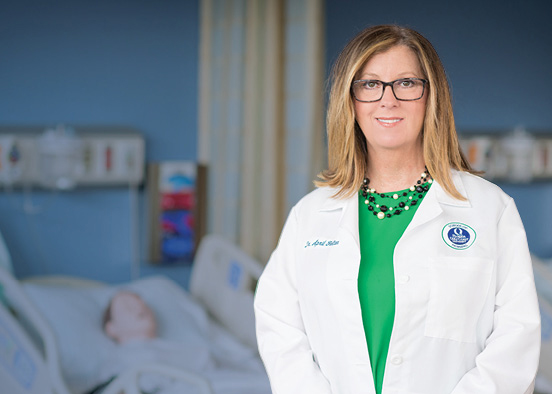
For almost a year, FGCU nursing graduates and faculty have been fighting an invisible enemy in the intensive-care units of hospitals throughout the country, tending to the innocent victims of an unpredictable worldwide war.
Like others in the Florida Gulf Coast University family, they answered the call to serve at the frontlines of the COVID-19 pandemic. They are mental health counselors as well as teachers, community advocates and scientists, engineers and entrepreneurs — a legion of ordinary people who became extraordinary in challenging times and demonstrated the impact of FGCU in communities near and far.
Kelly Goebel, an assistant professor in FGCU’s School of Nursing, continues to treat coronavirus victims as an acute care nurse practitioner at a local hospital when she’s not teaching the nurses of tomorrow. She and her peers are incorporating what they’ve experienced on the frontlines into the school’s curriculum where appropriate and feasible, so that the next class of graduates benefits from the wisdom gained in the ongoing teachable moment that is the pandemic.
“We talk about it on a personal basis — what the experience is like and what to expect when they start their nursing careers,” Goebel said. “It is important for us to talk about our experiences as frontline nurses; our goal is to prepare our nursing students for future practice. There definitely is a nursing shortage at this time. We need more nurses at the bedside to help now, during the pandemic, as well as in the future.”
Goebel and her colleagues in Marieb College educate Florida’s best-prepared nurses. Graduates with a bachelor of science (BSN) regularly achieve 100% employment and 100% pass rates on licensing exams. The national professional organization RegisteredNursing.org ranks the program No. 1 in Florida.
But the BSN program is a limited-access program. Admitting more students in order to graduate more nurses to fill the community need would mean adding more faculty and other resources, which would require financial support.
“We do want to recruit more students and more faculty,” Goebel said. “We want to grow our program and provide a pipeline from FGCU to our local facilities. This will help meet the needs of the community. They want to get our nursing students in their facilities earlier so they can recruit them for actual positions when they graduate. Our students are out there doing vaccinations now — that’s exciting. But they need more people, even just to help do vaccinations.”
Throughout the pandemic, healthcare workers have continued to adapt to constant change — in workplace conditions, in scientific knowledge, in treatment protocols. One of the toughest aspects to deal with has been the inability of patients to have family members with them during their illness, according to Goebel. When a patient is diagnosed with COVID-19, family members are not permitted at the bedside. Visitation restrictions are difficult as many critically ill patients have life-threatening conditions and could use the support of their family and friends more than ever.
“It certainly isn’t easy for the patient and their family, but neither is it for the nurses providing the care,” Goebel said. “Nurses are used to doing so much more to help families cope with patients who are acutely ill; it is frustrating, but at the same time, I think we feel honored to be in this position.”
Compassion has always been part of the foundation of a nursing education at FGCU, which prides itself on developing engaged leaders who deliver transformative care, conduct research and promote evidence-based practice through academic and community partnerships. Early in the global pandemic, professors and students pivoted to new distance-learning models, with robust resources and rigorous virtual simulations. In recent months, student nurses have been able to return to clinical settings for hands-on experiential learning.
“It is an unprecedented time, but I think we at FGCU have done the best we can in demonstrating the important role that nursing plays in times like these,” said Goebel, who earned her undergraduate degree at St. Joseph’s College of Nursing in Joliet, Illinois, her master’s at Loyola University in Chicago and completed her doctoral studies at the University of South Florida.
As leaders on the frontlines, Goebel and her colleagues already are looking ahead to how the lessons they’ve learned battling COVID-19 can better prepare the next generation of healthcare heroes for times like these.
“There has been a tremendous amount of work done by a large group of professionals to provide comprehensive guidelines for the management of this pandemic,” Goebel said. “Moving forward, we will need a continual, multidisciplinary approach working collaboratively on policy development, research, evaluation, surveillance and treatment within the hospital systems, the local community as well as our FGCU community. We cannot get complacent.”[/vc_column_text][vc_column_text]
SUPPORT THE FRONTLINES
This is part of a series of stories spotlighting FGCU students, faculty and alumni making an impact during the pandemic.
 By investing in a scholarship or a program at FGCU, you can empower more individuals like them to make a difference where it matters most — on the frontlines. For information on how you can help, call FGCU Advancement at 239-590-1067, or visit FGCU on the Frontlines to see more stories and give online.[/vc_column_text]
By investing in a scholarship or a program at FGCU, you can empower more individuals like them to make a difference where it matters most — on the frontlines. For information on how you can help, call FGCU Advancement at 239-590-1067, or visit FGCU on the Frontlines to see more stories and give online.[/vc_column_text]